- 1. Lighting Your Garage Workshop
- 2. Factors to Consider When Choosing Lighting
- 3. Ventilating Your Garage Workshop
- 4. Heating and Cooling Your Garage Workshop
- 4.1. Heating
- 4.2. Air Conditioning
- 4.3. Insulation
- 4.4. Electricity for Your Garage Workshop
- 5. Must-Have Items for Your Garage Workshop
- 5.1. Workbench
- 5.2. Storage
- 5.3. Power Tools
- 5.4. Hand Tools
- 5.5. Shop Vacuum
- 5.6. Safety Equipment
- 6. Must-Have Tools for Your Garage Workshop
- 6.1. Drill
- 6.2. Circular Saw
- 6.3. Hand Saw
- 6.4. Hammer
- 6.5. Screwdriver
- 6.6. Socket Wrench Set
- 6.7. Pliers
- 6.8. Utility Knife
- 6.9. Level
- 6.10. Measuring Tape
- 6.11. Stud Finder
- 6.12. Ladder
- 6.13. Extension Cords
- 7. Invest in Quality Equipment
- 8. Make Storage a Priority
- 9. Don’t Forget About the Garage Floor
- 10. Get Working in Your Garage Workshop
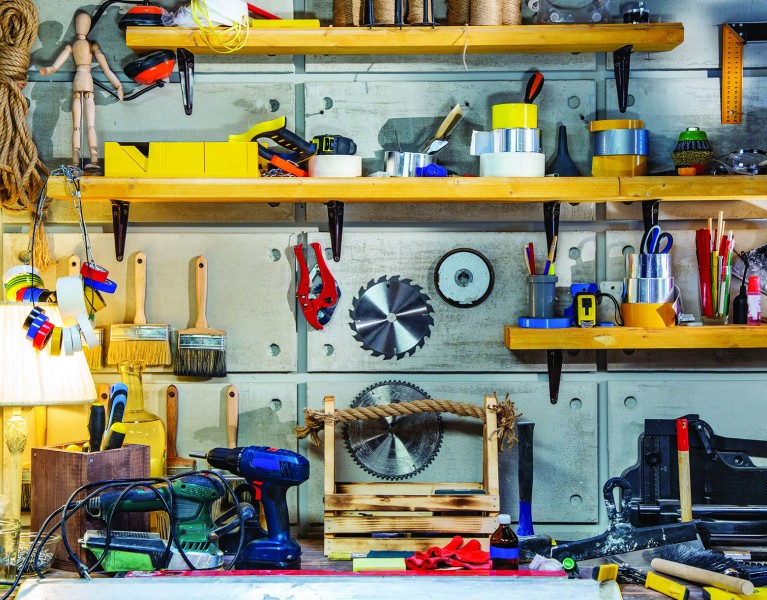
How to Build a Garage Workshop
Table of Contents [Show]
You have a home. You have a garage. You love working with your hands. You need a home garage workshop.
Whether you’re a carpenter, a welder or someone who likes to tinker with tools, having a garage workshop is a great asset. Not only do you have a dedicated space to work on projects, but you can also customize it to suit your specific needs. A workshop is also an extension of your home, so you want it to be comfortable as well as functional. When you take on the project of building your own garage workshop, you’ll be set when it comes to working on future projects. Consider the following when creating your garage workshop:
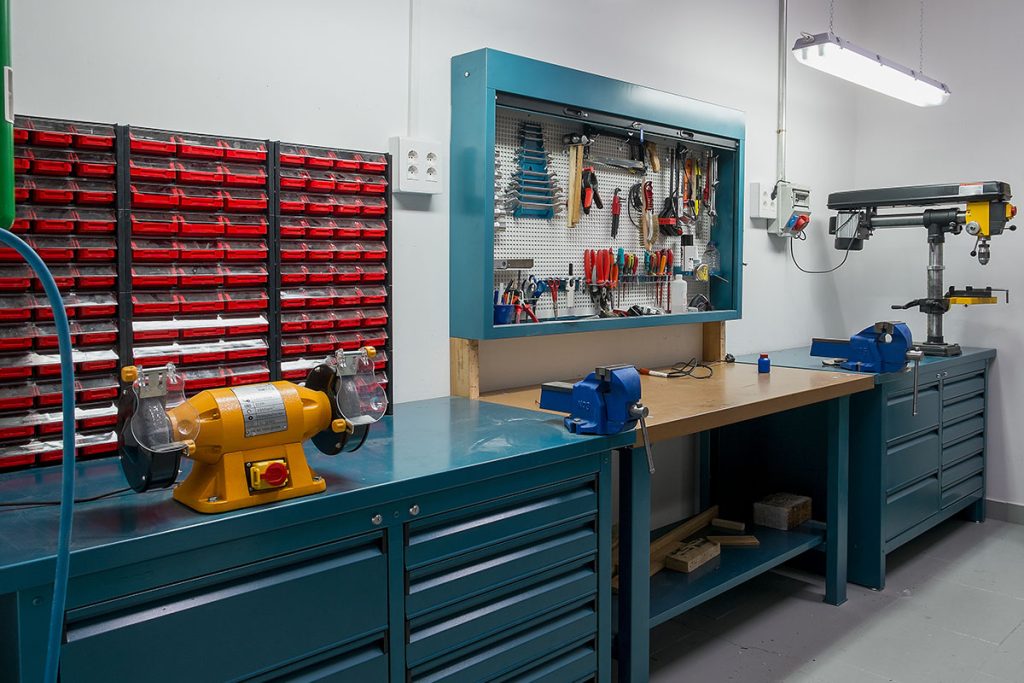
Lighting Your Garage Workshop
The right lighting will make a big difference in your workspace. It can help you see things with ease, allow you to be more productive, and prevent eye strain. When it comes to lighting in a workshop, there are a few different options:
- Natural light sources like windows and skylights
- Overhead lights
- Task lamps
- Floor lamps
Whatever kind of lighting you choose, make sure that it's easy to adjust. It should have many levels of brightness so that you can control the amount of light you need. If possible, choose lights with a dimmer switch so you can turn the lights down when they're not needed.
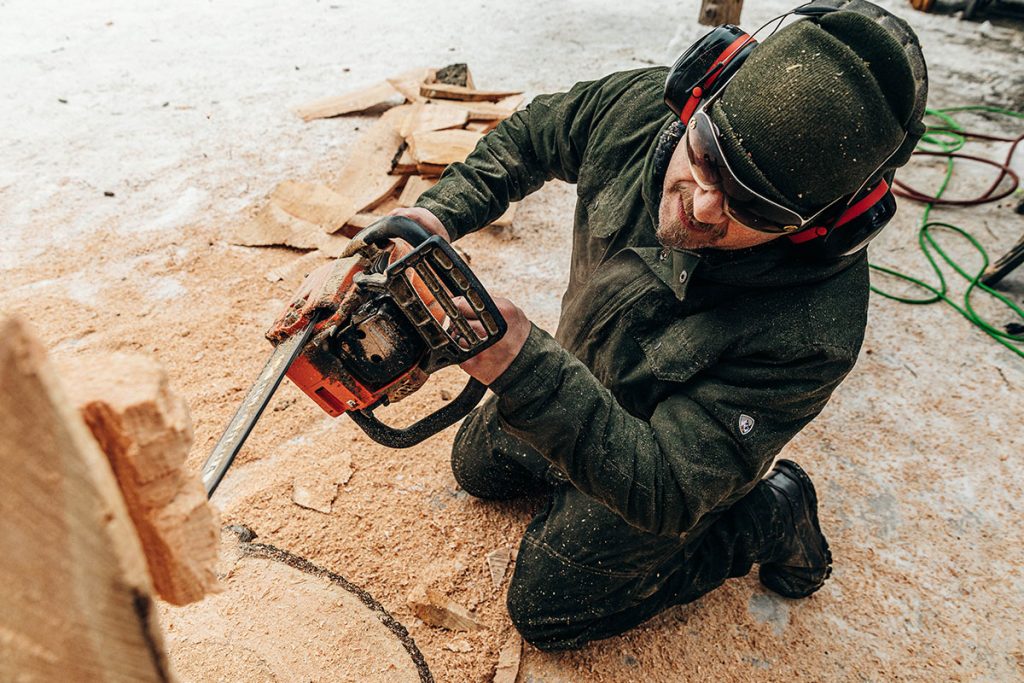
Factors to Consider When Choosing Lighting
- Garage Size. The size of your garage is one of the most important factors when it comes to lighting. A larger garage, or garage space, will need more light than a smaller one. The number of windows in that space will also be a factor. Less, or no, windows means more light is needed.
- Type of Project. The type of project you’ll be doing in your workshop is also important. If you’re just using it for basic tasks like woodworking or tinkering with your car, you won’t need as much light as someone who’s using it for more demanding tasks like welding.
- Type of Light Fixture. Another factor to consider is the type of light fixtures you’re using. A fluorescent light will provide more light than an incandescent bulb, for example.
- Amount of lumens needed. How many lumens (the total amount of visible light seen by the human eye from a lamp or light source) do you need for garage lighting? A good rule of thumb is to use 100 lumens per square foot of workspace. If you have a 200-square-foot garage, you’ll need at least 20,000 lumens of light.
Of course, this is just a general guideline. You may need more or less light depending on the specific circumstances of your garage. Use this guideline for a good starting point when choosing the right light fixtures for your needs.
Ventilating Your Garage Workshop
Ventilation is an important consideration in any garage workshop, especially if it is attached to your home. There are a few different ways to ventilate a workshop:
- The most common way to ventilate a workshop is to open doors and windows to allow fresh air to enter.
- Portable fans will help to move the air around and ensure that all areas of the workshop are ventilated.
- One of the best options is to install an exhaust fan, which pulls air out of the workshop and vents it to the outside.
Proper ventilation will help to ensure the health and safety of anyone working in the space.
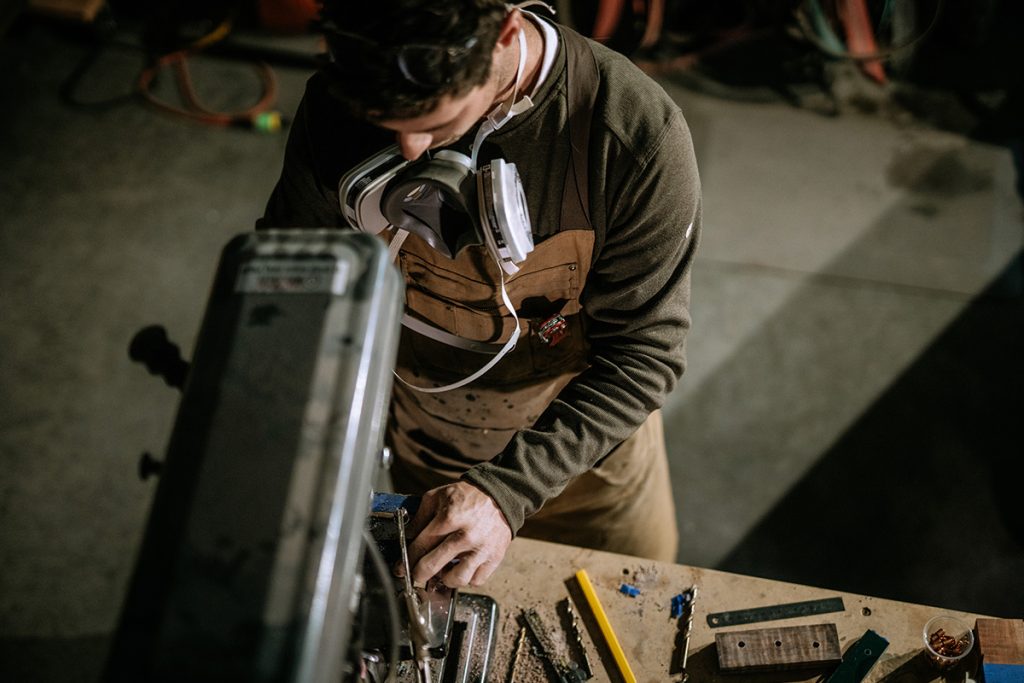
Heating and Cooling Your Garage Workshop
Heating
The best way to heat your garage workshop is with an electric garage heater. An electric garage heater is easy to install and maintain. The most common type of electric garage heater is a forced-air heater. Forced-air heaters work by circulating heated air through the garage using a fan. These heaters are the most efficient and can warm up large areas.
Another type of electric garage heater is the radiant heater. Radiant heaters work by emitting infrared waves that heat objects rather than the air. These heaters are more efficient when warming up smaller areas.
Air Conditioning
When it comes to cooling your garage, one of the most preferred methods is to install a ductless air conditioner. This is the easiest way to keep your garage cool during hot summer days. Another option is to install a garage attic fan. Both of these are efficient at keeping a cool garage when you’re trying to work for long hours in the heat.
Insulation
Another way to keep your garage workshop comfortable year-round is to insulate it. This helps keep the temperature inside the workshop more consistent, while also reducing noise from outside. Don’t forget about the garage door - you may want to consider investing in an insulated garage door if you don’t already have one.
Electricity for Your Garage Workshop
If you’re going to use your garage to power electrical devices like a saw and a portable air conditioner, you may need to upgrade your garage’s electrical service. Make sure there are enough power outlets or sockets around the workshop so you always have access to electricity anywhere you need it.
Before you install a workbench, tool cabinets, or shelving, ensure there are enough power outlets or sockets to get your tools running once the workshop is completed and ready for use.
Note: Work with a qualified electrician to get this work done. Don’t upgrade your own electrical service unless you happen to be a trained electrician.

Must-Have Items for Your Garage Workshop
Now that your garage is set with the perfect lighting, heat, air conditioning, and good ventilation, it's time to put your workshop together. No matter what kind of work you do in your garage workshop, there are certain must-have items that you need in order to be productive and efficient. Here is a list of the must-have items for a garage workshop:
Workbench
A workbench is the most important item in a garage workshop. It provides a dedicated, flat surface for working on projects. Outfitted with drawers or shelving, it can also be used for storage.
If your space is limited, consider purchasing or building a folding workbench or one that allows rolling tool chests to fit underneath to maximize space and storage.
Storage
Storage is essential for an efficient, well-functioning workshop. This is especially important when it’s a garage space that is shared with vehicles and other items. You need spaces to store away and organize tools and equipment. Some storage ideas include:
- Shelves. Shelving provides open space for storing tools, materials, and other items.
- Cabinets. Cabinets can be used for larger items or for organizing smaller items that you want to be stored behind closed doors. Cabinets provide a clean, organized look to the garage and can be purchased or made in many different configurations and sizes.
- Tool Chest. A tool chest is another essential item for a garage workshop. A tool chest helps to keep your tools organized and safe, and it also provides additional storage space.
- Pegboard/Hooks. If you have limited space in your garage, it’s important to use all areas wisely, including the walls. Pegboards and wall hooks are great inexpensive ideas for vertical storage. Hanging tools and other equipment on the pegboard or hooks allows for easy access and organization.
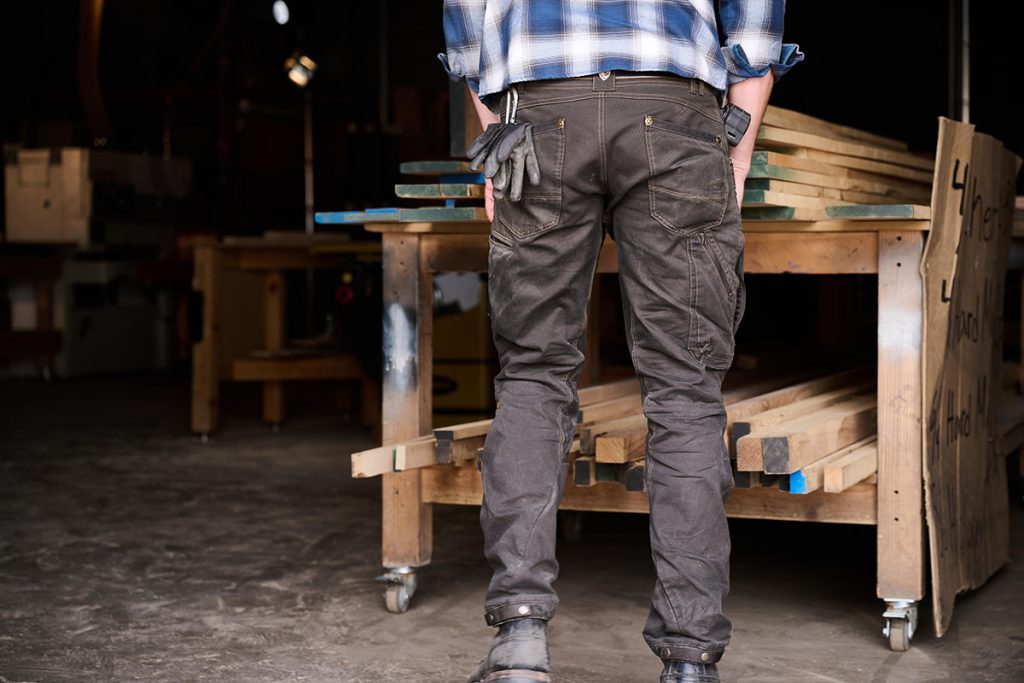
Power Tools
A set of power tools can make many tasks easier and faster, and they can also help you to complete projects that would be difficult or impossible to do by hand. Some examples are a jigsaw, circular saw, and power drill.
Hand Tools
A good set of hand tools are a must for everyone. They can be used for a variety of things, and they can also be used for tasks that power tools cannot.
Shop Vacuum
Effective dust control is key to a clean, healthy, and productive garage workshop. If you are working with wood often, it is important to have a vacuum system set up.
Safety Equipment
Safety equipment is essential in a garage workshop. Safety equipment includes items such as gloves, safety glasses, and earplugs, as well as a fire extinguisher and first-aid kit.
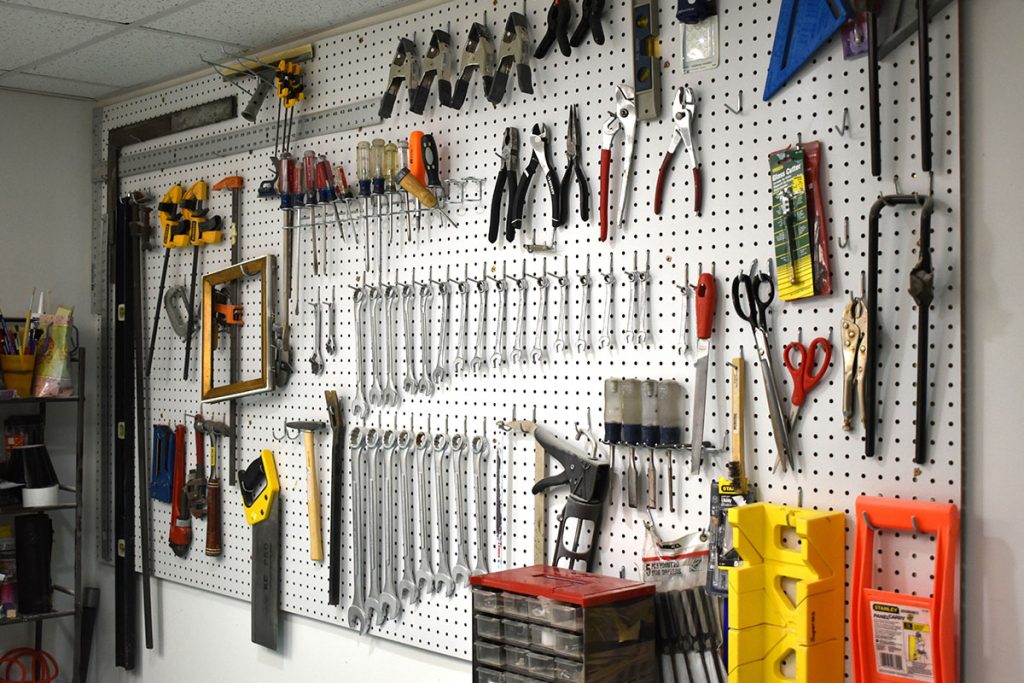
Must-Have Tools for Your Garage Workshop
You can take care of many home improvement projects with just a few basic tools. But if you plan on spending some time building and repairing things in your garage workshop or have more extensive home updates, these tools will get you started:
Drill
A good power drill is one of the best investments you can make for your garage workshop. It can drill holes and drive screws and bolts much faster than can be done with hand tools. If you won’t use a drill often, consider a corded drill. But a cordless drill is easy to use and makes projects even more efficient (as long as you remember to keep it charged). Look for a model that recharges quickly or comes with two batteries.
Circular Saw
An electric circular saw is great for cutting lumber and plywood. Avoid buying the cheapest saw you find; it won’t last and won't be powerful enough for some cutting chores.
Hand Saw
If you don’t see yourself needing an electric saw, at least equip yourself with a hand saw. You’ll be surprised what a hand saw can accomplish.
Hammer
Pick a good-quality curved claw hammer with a steel or fiberglass handle. Make sure it’s not too light (nothing under 16 ounces).
Screwdriver
There’s no need to have several random screwdrivers all over the place. The best choice is a four-in-one model that allows you to switch quickly between straight-slot or Phillips-head needs, in two standard sizes.
Socket Wrench Set
A 3/8-inch socket wrench with a couple of extenders and a set of sockets will make quick work of tightening and loosening nuts and bolts. For small, quick jobs, an 8- or 10-inch adjustable wrench is handy to have.
Pliers
Slip-joint pliers are the most versatile type of pliers and belong in every toolbox.
Utility Knife
One of the cheapest tools in your workshop, and one that will come in handy on a regular basis. Look for one with a retractable blade, and always remember to retract it before setting the knife down. A dull blade is more likely to cause injuries than a sharp one, so change it often.
Level
The most useful level is a two- or four-foot carpenter's level. If you plan to do a lot of home remodeling, keep both on hand.
Measuring Tape
A 25-footer with a one-inch wide tape will handle nearly every measuring need you have.
Stud Finder
Battery-operated Zircon stud finders are great to have for locating studs in drywall. On thicker plaster walls, using the metal-sensing setting on certain stud finders works well.
Ladder
The ladder is definitely a must-have. You’ll use it to replace lights, paint the bedroom, clean windows, hang Christmas lights, and much more. A good, aluminum 6-foot model is sufficient, but you may also want to invest in an extension ladder if you have higher areas you need to reach.
Extension Cords
Extension cords come in handy for many projects, both indoors and out. Make sure you have a collection of different lengths on hand for when you may need them.
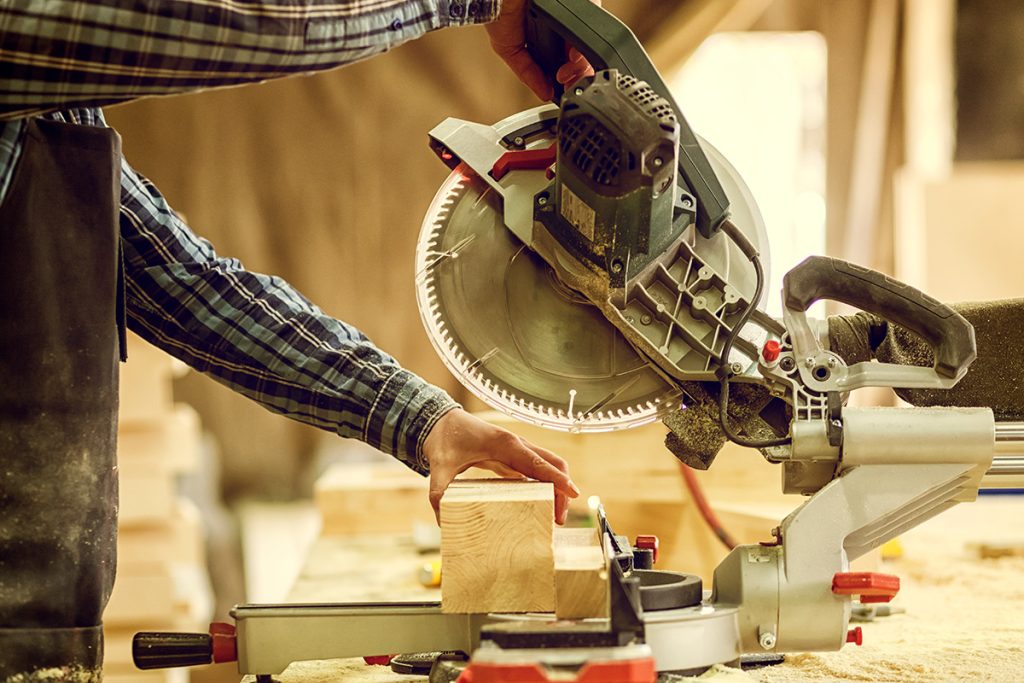
Invest in Quality Equipment
If you're serious about your garage workshop, then having quality equipment is a must. Not only will it help you get the job done right, but it will also last longer and make your workshop more efficient. Here are a few reasons why investing in quality equipment for your garage workshop is so important:
- Saves you time and money in the long run.
- Helps you work more efficiently.
- Makes your workshop more enjoyable to use.
- Lasts longer and withstands more wear and tear.
- Increases the value of your workshop.
Buying quality equipment for your garage workshop is an investment that will pay off in the long run. You'll end up with a garage workshop that you enjoy using for years.
Make Storage a Priority
A garage workshop is a great place to get creative and work on projects, but it can become cluttered and disorganized quickly. One way to keep your workspace organized and tidy is to make storage a priority. Here are a few reasons why storage should be a priority in your garage workshop:
- It will keep your workspace clean and clutter-free. By investing in some storage solutions, you can keep your workspace tidy and organized.
- You'll find what you need with ease. If your garage workshop is full of stuff, it can be tough to find what you need when you need it. If you have everything organized and stored in a specific place, you'll be able to grab what you need.
- Your projects will be better organized. If you're searching through the clutter for tools and materials, it can be tough to stay focused on your project. But if everything is in a specific place, you'll be able to stay on track and get your project done more quicker.
- Your workspace will be more enjoyable to use. If your garage workshop is a cluttered mess, it's likely that you won't enjoy spending time there. But if it's organized and tidy, you'll actually look forward to spending time in your workspace and working on your projects.
- It’s a shared space. More often than not, a garage workshop is shared with vehicles, seasonal items, sports equipment, lawnmowers, etc. Having a specific work area with dedicated storage will keep your workshop tidy and all your tools where they need to be.
Making storage a priority in your garage workshop is a smart move that will pay off in the long run. By keeping your workspace clean and organized, you'll be able to work more and actually enjoy spending time there.
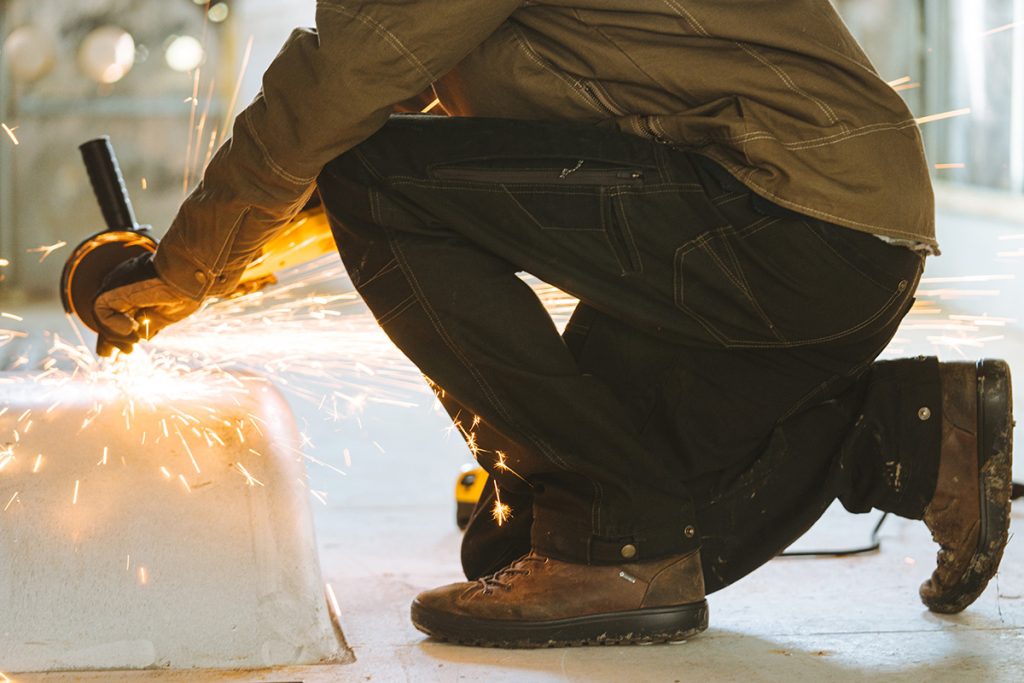
Don’t Forget About the Garage Floor
A garage workshop is all about having a specific space to build, make and create. You can definitely make it comfortable with lighting, heat, and air conditioning, but if you use your workspace often, make sure it is a comfortable place for your feet. Standing for long periods of time on hard concrete can easily fatigue your legs and feet. Here are some ideas to make your garage floor as comfortable as the rest of the workshop:
- Carpet Pad. A double layer of foam carpet pad makes an inexpensive anti-fatigue mat beside workbenches and power tools. Cut the pad to size with a utility knife, scissors, or tin snips. To avoid tripping and to keep the edges from curling, tape down the perimeter with packing or duct tape.
- Fatigue Mat. Invest in a commercial-grade mat that’s at least ½-inch thick for extended leg and back support.
- Interlocking Foam Pads. These foam squares can be found at most home improvement stores in different thicknesses and colors. They can easily be changed out if damaged.
Get Working in Your Garage Workshop
Your garage can be so much more than a place to park your car and store your holiday decorations. Having easy access to a workshop right outside your home will allow you to create, build and fix things easier and more efficiently. When you are ready to build your own garage workshop, make sure it is well-lit, well-ventilated, and a comfortable place to work for extended periods. You will also need to outfit it with the proper storage, functional workspace, and handy tools to fit your needs. There are so many benefits to having a garage workshop – from simple home repairs to tackling DIY projects – so get working!
Featured image by: Georgiy.


